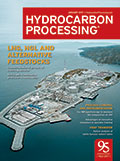
Special Focus: LNG, NGL and Alternative Feedstocks
In Part 1 of this article, the incentives and information needed to relax the constraints of being O<sub>2</sub>-free are outlined. The authors hope that this perspective provides new directions for improving the economics of using pyoil to produce advanced biofuels (ABFs).
With the continued development of sour gas fields around the world, the removal of mercaptans from gaseous and liquid hydrocarbon streams is becoming a challenge for today’s gas processing plants.
The COP21 event left the world with new mandates to develop and implement low-emissions energy sources to power the global economy. To limit global warming, the world must increase the use of resources like natural gas, which offers a quick, relatively clean and inexpensive interim step in the global transition from high-emissions resources to renewable energy sources.
Heat Transfer
A detailed failure investigation into the cracking of ethylene furnace radiant tubes included visual, fractographic, metallographic, scanning electron microscopy/x-ray spectroscopy, and hardness and chemical examinations. These analyses showed that the tube crack was initiated by thermal shock, accompanied by restrained thermal expansion due to internal coke layer formation. Details of the failure’s contributing factors, and recommendations to avoid similar failures, are shared here.
Process Control and Instrumentation
Near-infrared (NIR) spectroscopy is a powerful tool that is in widespread use in the refining, chemical, pharmaceutical and agricultural industries. NIR spectroscopic process analyzers are commonly used in refineries for a variety of composition and physical property measurements, such as octane number, aromatics content and distillation properties of feed and finished products.
Workforce reduction, the expected retirement of baby boomers, personnel leaving the industry in search of better opportunities, and the lack of jobs for new graduates will create a skills deficit once the industry begins growing again.
One of the unfortunate realities of automation in process industries is the stubborn inability to improve on the weakest link of the chain: human beings.
Maintenance and Reliability
With increasing worldwide demand for diesel, more stringent product specifications for cleaner fuels, reduced fuel oil demand and the economic advantages of processing heavier, sourer crudes, the demand for hydrogen in refineries continues to increase.
Process Engineering
The crude oil refining and petrochemical industries make extensive use of condensers that operate under vacuum (i.e., below atmospheric pressure). Distillation is the most common process using these condensers, either as a process precondenser ahead of an ejector system, or as an intercondenser within an ejector system.
Columns
In the publishing business, a key editorial responsibility is ensuring the integrity of all articles that are chosen for publication. This column elaborates on additional ways that prospective authors can help ensure that readers trust what we print.
In this column, I have often elaborated on critical information related to reliability thinking. However, reliability thinking is continually subverted by approaches that concentrate excessively on project cost and completion.
Energy producers are under tremendous pressure to reduce operational costs and maximize efficiency throughout the value chain. This is easier said than done.
When I started working in industry 50 years ago, it was management’s job to have a senior engineer watch over my work. Much of the quality of my analytical work and technical discipline were formed early in my career with help from these engineers.
Management commitment is an essential ingredient for building a healthy organizational safety culture. To achieve this objective, management must provide adequate resources, along with unstinted support and direction.
It is no secret that capital costs of major projects have skyrocketed over the past decade. A July 2015 industry report noted that the average megaproject’s cost increase is 80% of its original value, with an average schedule slippage of 20 months.
Trends and Resources
According to <i>Hydrocarbon Processing’s</i> Construction Boxscore Database, over 1,000 new projects have been announced since 2014. Nearly half of these projects were announced in 2014, and the trend shows a steady decline in new project announcements since that time.
India is emerging as the world’s new oil demand center. Complementing its thirst for crude oil, the country has the potential to become a hotbed for natural gas consumption over the next few years.
Healthy US domestic gasoline demand continued, despite supply pressure from refineries returning from maintenance and resumed Colonial Pipeline operations.
Lubricants play a key role in equipment performance and reliability. ExxonMobil has redesigned used lubricant analysis service to be quicker, easier and more useful.
ValvTechnologies Inc. has named Herman Benard Jr. as director of manufacturing. He will have senior management responsibility for the achievement of production, productivity, quality, safety and customer satisfaction goals, as well as spearheading manufacturing process continuous improvements.

- INEOS receives €300-million grant to rejuvenate and decarbonize its Lavera plant 2/19
- AGC Vinythai commissions expanded chlor-alkali plant and e-BiTAC electrolyzers from thyssenkrupp nucera 2/19
- BASF launches AdBlue GE (green electricity) to decarbonize mobility value chain 2/19
- Carbon Neutral Fuels select Johnson Matthey, bp and Honeywell UOP technologies for UK SAF plant 2/19
- ExxonMobil starts operations on second carbon capture project in Louisiana (U.S.) 2/19
- Pall introduces two new technologies to reduce CAPEX and TCO in oil and gas processing 2/19




